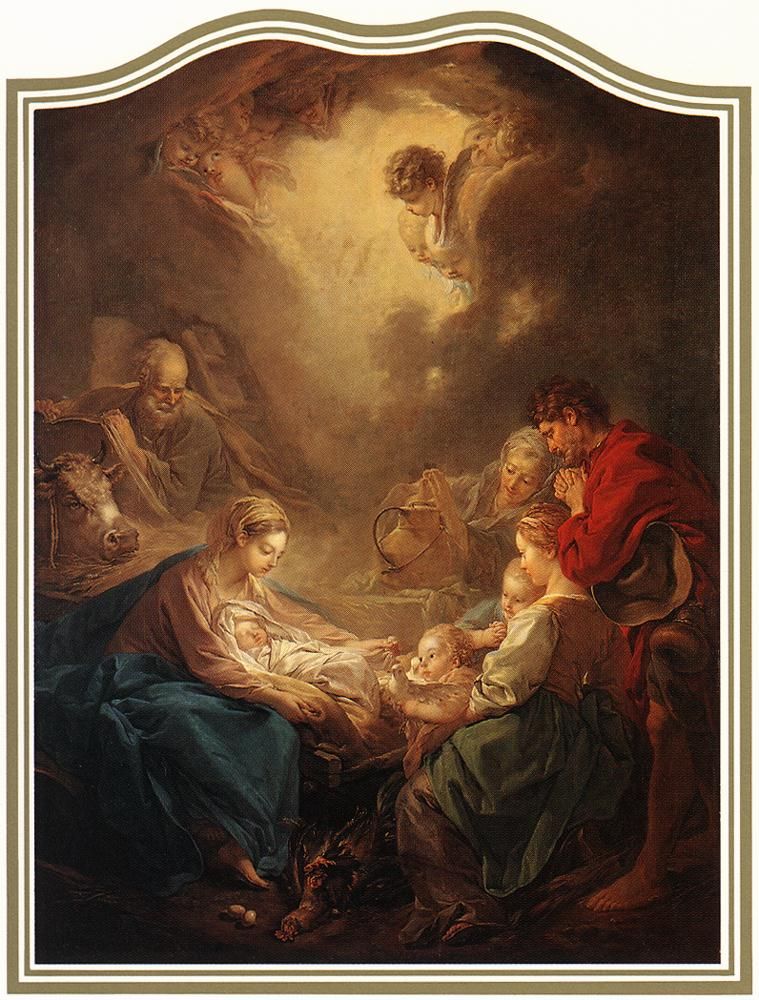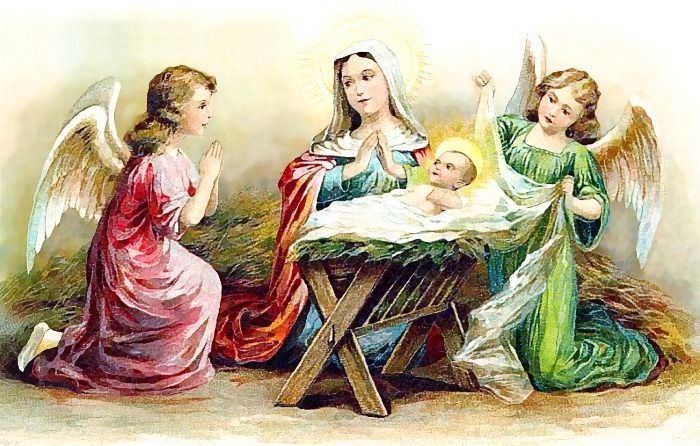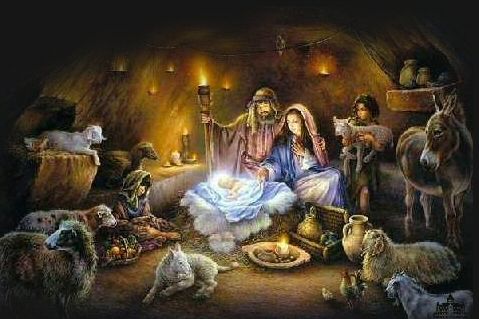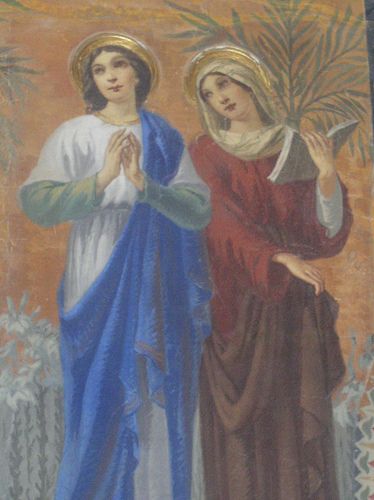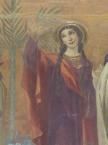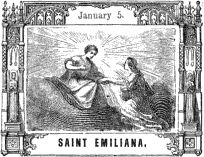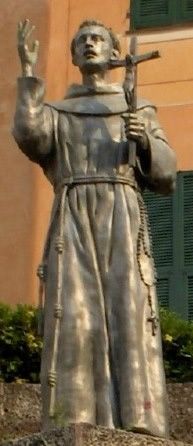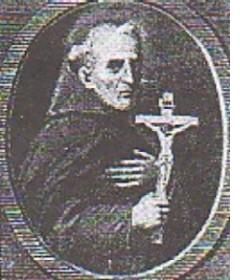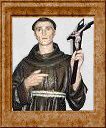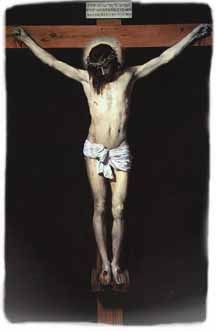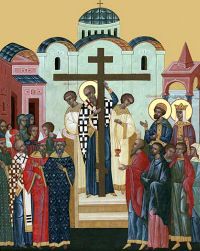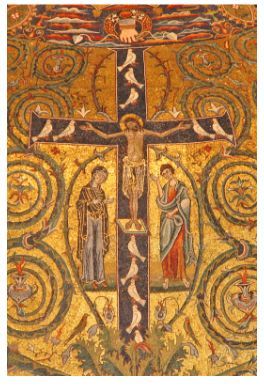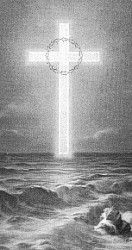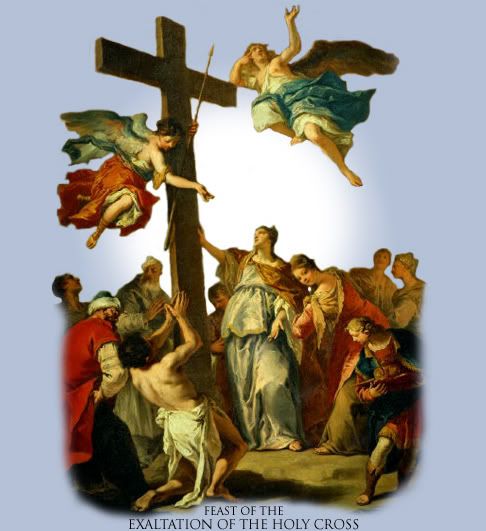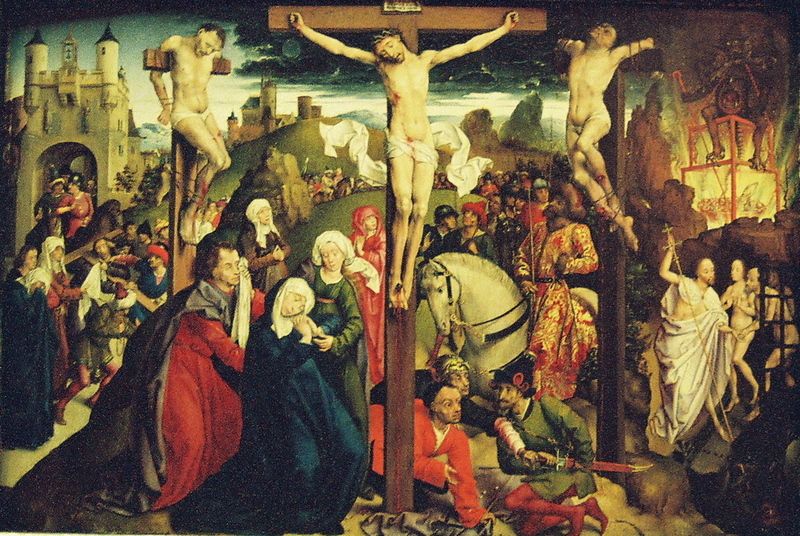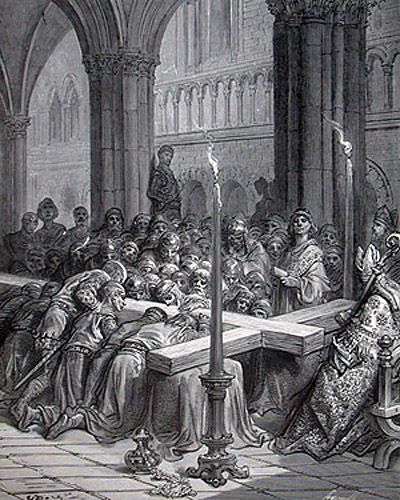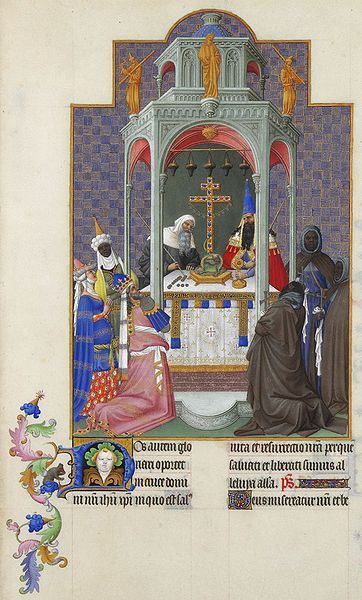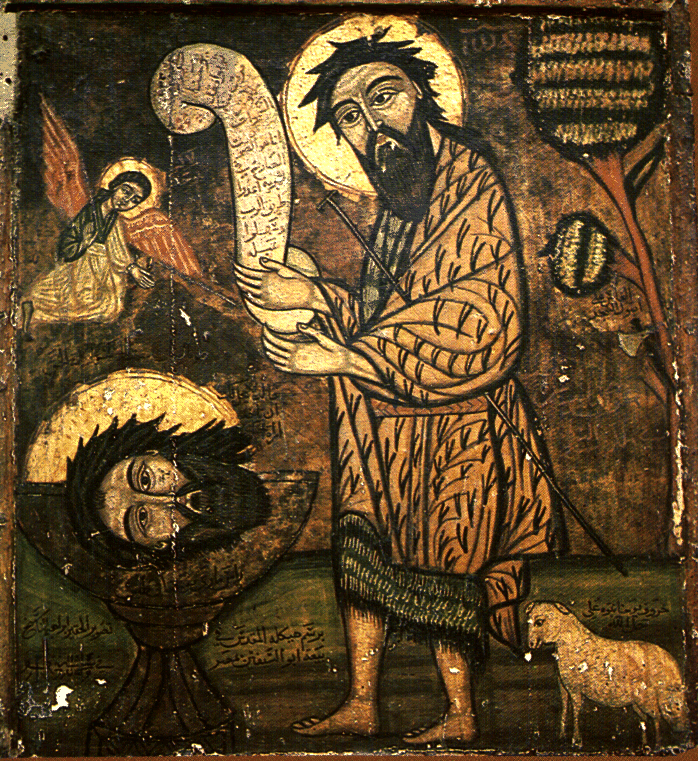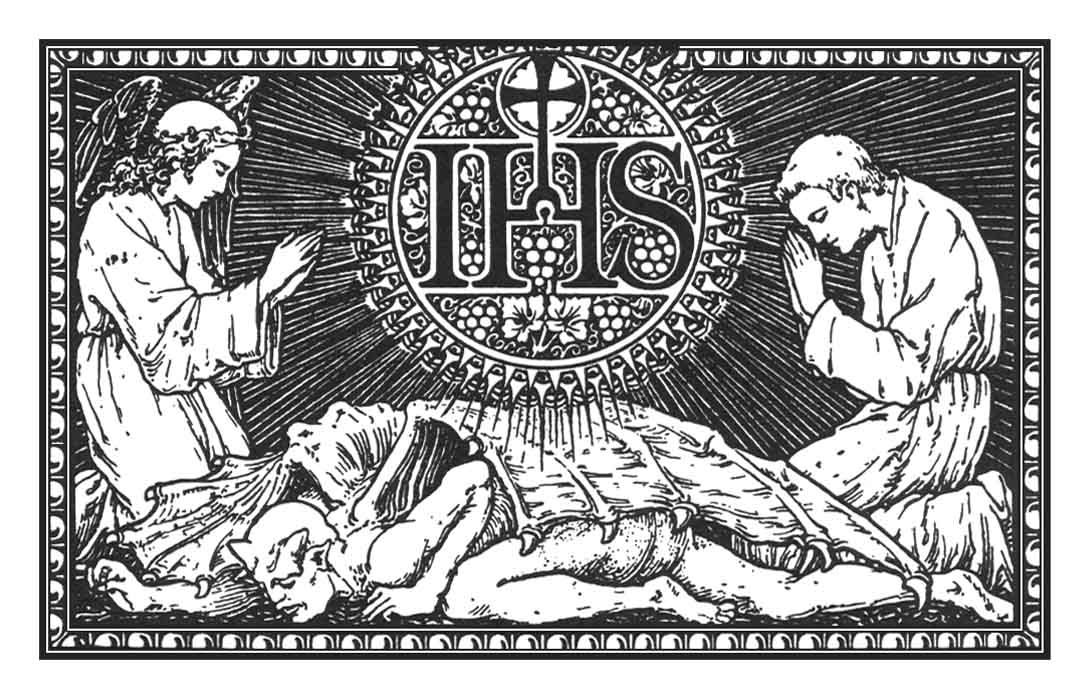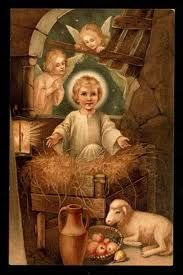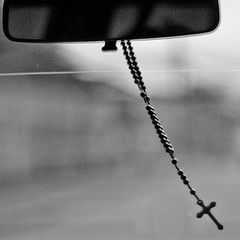On this, the most beautiful of days, we turn our faces to the Lord. In His gaze, we find salvation, redemption, and endless, infinite love. And this, the dawning of truth, is why we celebrate Christmas! Below, and excerpt from Saint Augustine of Hippo, “Why Celebrate Christmas?”
Awake, mankind! For your sake God has become man. Awake, you who sleep, rise up from the dead, and Christ will enlighten you. I tell you again: for your sake, God became man.
You would have suffered eternal death, had he not been born in time. Never would you have been freed from sinful flesh, had he not taken on himself the likeness of sinful flesh. You would have suffered everlasting unhappiness, had it not been for this mercy. You would never have returned to life, had he not shared your death. You would have been lost if he had not hastened ‘to your aid. You would have perished, had he not come.
Let us then joyfully celebrate the coming of our salvation and redemption. Let us celebrate the festive day on which he who is the great and eternal day came from the great and endless day of eternity into our own short day of time.
He has become our justice, our sanctification, our redemption, so that, as it is written: Let him who glories glory in the Lord.
Truth, then, has arisen from the earth: Christ who said, I am the Truth, was born of the Virgin. And justice looked down from heaven: because believing in this new-born child, man is justified not by himself but by God.
Truth has arisen from the earth: because the Word was made flesh. And justice looked down from heaven: because every good gift and every perfect gift is from above.
Truth has arisen from the earth: flesh from Mary. And justice looked down from heaven: for man can receive nothing unless it has been given him from heaven.
Justified by faith, let us be at peace with God: for justice and peace have embraced one another. Through our Lord Jesus Christ: for Truth has arisen from the earth. Through whom we have access to that grace in which we stand, and our boast is in our hope of God’s glory. He does not say: “of our glory”, but of God’s glory: for justice has not come out of us but has looked down from heaven. Therefore he who glories, let him glory, not in himself, but in the Lord.
For this reason, when our Lord was born of the Virgin, the message of the angelic voices was: Glory to God in the highest, and peace to men of good will.
For how could there be peace on earth unless Truth has arisen from the earth, that is, unless Christ were born of our flesh? And he is our peace who made the two into one: that we might be men of good will, sweetly linked by the bond of unity.
Let us then rejoice in this grace, so that our glorying may bear witness to our good conscience by which we glory, not in ourselves, but in the Lord. That is why Scripture says: He is my glory, the one who lifts up my head. For what greater grace could God have made to dawn on us than to make his only Son become the son of man, so that a son of man might in his turn become son of God?
Ask if this were merited; ask for its reason, for its justification, and see whether you will find any other answer but sheer grace.
Why pray the Rosary every day for a year?
Each time the Blessed Virgin has appeared-- whether it be to Saint Bernadette Soubirous at Lourdes; to Lucia, Jacinta, and Francisco at Fatima; or to Mariette Beco at Banneux-- she has asserted the importance, saving grace, and power of praying the Holy Rosary on a daily basis. Based upon her words, the Rosary is penance and conversion for sinners, a pathway to peace, an end to war, and a powerful act of faith in Jesus Christ. Pope Paul VI presented the Rosary as a powerful means to reach Christ "not merely with Mary but indeed, insofar as this is possible to us, in the same way as Mary, who is certainly the one who thought about Him more than anyone else has ever done."
To show us how this is done, perhaps no one has been more eloquent than the great Cardinal Newman, who wrote: "The great power of the Rosary consists in the fact that it translates the Creed into Prayer. Of course, the Creed is already in a certain sense a prayer and a great act of homage towards God, but the Rosary brings us to meditate again on the great truth of His life and death, and brings this truth close to our hearts. Even Christians, although they know God, usually fear rather than love Him. The strength of the Rosary lies in the particular manner in which it considers these mysteries, since all our thinking about Christ is intertwined with the thought of His Mother, in the relations between Mother and Son; the Holy Family is presented to us, the home in which God lived His infinite love."
As Mary said at Fatima, "Jesus wants to use you to make Me known and loved. He wishes to establish the devotion to My Immaculate Heart throughout the world. I promise salvation to whoever embraces it; these souls will be dear to God, like flowers put by Me to adorn his throne."

Happy soul! she shall discover
What joy, what bliss,
How many heavens at once it is,
To have a God become her Lover!
Today, December 24, we celebrate the feast day of Saints Emiliana and Tarsilla (died sixth century), Virgins of the Church, and aunts of Saint Gregory the Great. What we know of their lives was recorded by the holy pope, who was deeply moved by their model of Christian life and virtue.
Born in Rome, Emiliana and Tarsilla were the daughters of senator Gordian and Saint Silvia. Nieces of Pope Saint Felix III, the young women were destined for lives of holiness, and together, while quite young, renounced the world. As young women, they together consecrated themselves to the Lord, desiring to stay pure. Their house was as a convent, and the two spent so much time kneeling in prayer that their knees and elbows arthritically locked in the position of prayer. Living as hermits, they encouraged one another in the ways of the faith, drawing deeper and deeper into the spiritual life.
Tarsilla and Emiliana had a third sister, Gordiana, who had initially made the same vows and consecrated herself to the Lord. Gradually, however, she withdrew from her sisters, returning to the world. Their reproaches fell on deaf ears, and caused them significant sadness and grief.
Saint Tarsilla died prior to Saint Emiliana, but not before she received a vision of her uncle, Pope Saint Felix. In her vision, the pope appeared to her, showing her a place of great beauty. He said, “Come, I will receive you into this habitation of light.” Immediately, she fell ill with fever. Her sister ministered to her, but to no avail. By the following day, her illness had grown worse. Saint Tarsilla, in agonizing pain, called out to those around her; “Make way! Jesus is coming!” With her eyes fixed firmly on heaven, she died soon thereafter, and a heavenly fragrance filled the room, confirming her visions.
Saint Emiliana was deeply saddened, made more difficult by missing her sister on Christmas. Emiliana received consolation in the form of a vision of her sister, however. In this vision, Tarsilla encouraged, “My sister, come! I did not celebrate with you the birth of the Lord, but together we will celebrate the feast of the Epiphany.”
“If you call only me,” Emiliana replied, “what will become of our sister, Gordiana?”
“Come,” Tarsilla sadly answered. “Our sister has decided to remain with the world.”
Soon thereafter, Saint Emiliana fell ill, and promptly joined her sister in heaven. Their relics are kept at the Oratory of Saint Andrew on the Celian Hill in Rome.
Pope Saint Gregory the Great recounted the tale of his aunts throughout his lifetime. He used it to illustrate the point that we must work constantly to save our souls, repenting for our actions. To Saint Gregory, there is no point in beginning the work of salvation, if we do not plan to see it through to the end. As we prepare for the birth of Our Lord, we look to our own commitments. Are we ready to greet the infant Christ, come to redeem and save us?
Tonight, we echo the sentiment of Saint Tarsilla: "Make way! Jesus is coming!" How might we use this dark night—lit by the choirs of angels—to prepare for the coming of the Lord?
Year 2: Day 358 of 365
Prayer Intentions: Preparation to greet Our Lord.
Requested Intentions: Healing (M); Safety, security, and sanctity for a family (A); Healing (N); Successful relationship (N); Healing of a friend; growth in the Lord (M); To hear and answer the Lord’s call (M); Healing of a friend undergoing chemotherapy (L); For the peace, safety, and holiness of a sister (J); Financial security (C); Conversion of a newly married couple (M); Peace in a family (S); Peaceful repose of departed mother (J); Blessings on a relationship (J); Financial security, successful employment (J); Obedience to God’s will (A); Conversion of souls (A); Success of business venture; faith of daughter (S); Safe return home (J); Recovery of mother and son; repose of the souls of the dearly departed (A); Blessings upon a relationship (M); Sobriety and recovery for a son (M); Employment and successful marriage (A); Employment, healing, freedom from anxiety (T); Financial security (C); Conversion (T); Peace in difficult times at work (E); Financial security and blessings for mother and children (T); Financial security for a mother (M); Health, finances, successful marriage (A); Successful resolution of court case for son (K); Continued sobriety (N); Healing of a chronic health condition (B); Successful employment (A): Peace in a family, recovery of a niece from substance use (L); Blessings on a marriage, healing of a husband (P); For the health and recovery of sisters (B); For a daughter and granddaughter (D); Blessings on overseas employment (M); Healing of mother (L).
What joy, what bliss,
How many heavens at once it is,
To have a God become her Lover!
Today, December 24, we celebrate the feast day of Saints Emiliana and Tarsilla (died sixth century), Virgins of the Church, and aunts of Saint Gregory the Great. What we know of their lives was recorded by the holy pope, who was deeply moved by their model of Christian life and virtue.
Born in Rome, Emiliana and Tarsilla were the daughters of senator Gordian and Saint Silvia. Nieces of Pope Saint Felix III, the young women were destined for lives of holiness, and together, while quite young, renounced the world. As young women, they together consecrated themselves to the Lord, desiring to stay pure. Their house was as a convent, and the two spent so much time kneeling in prayer that their knees and elbows arthritically locked in the position of prayer. Living as hermits, they encouraged one another in the ways of the faith, drawing deeper and deeper into the spiritual life.
Tarsilla and Emiliana had a third sister, Gordiana, who had initially made the same vows and consecrated herself to the Lord. Gradually, however, she withdrew from her sisters, returning to the world. Their reproaches fell on deaf ears, and caused them significant sadness and grief.
Saint Tarsilla died prior to Saint Emiliana, but not before she received a vision of her uncle, Pope Saint Felix. In her vision, the pope appeared to her, showing her a place of great beauty. He said, “Come, I will receive you into this habitation of light.” Immediately, she fell ill with fever. Her sister ministered to her, but to no avail. By the following day, her illness had grown worse. Saint Tarsilla, in agonizing pain, called out to those around her; “Make way! Jesus is coming!” With her eyes fixed firmly on heaven, she died soon thereafter, and a heavenly fragrance filled the room, confirming her visions.
Saint Emiliana was deeply saddened, made more difficult by missing her sister on Christmas. Emiliana received consolation in the form of a vision of her sister, however. In this vision, Tarsilla encouraged, “My sister, come! I did not celebrate with you the birth of the Lord, but together we will celebrate the feast of the Epiphany.”
“If you call only me,” Emiliana replied, “what will become of our sister, Gordiana?”
“Come,” Tarsilla sadly answered. “Our sister has decided to remain with the world.”
Soon thereafter, Saint Emiliana fell ill, and promptly joined her sister in heaven. Their relics are kept at the Oratory of Saint Andrew on the Celian Hill in Rome.
Pope Saint Gregory the Great recounted the tale of his aunts throughout his lifetime. He used it to illustrate the point that we must work constantly to save our souls, repenting for our actions. To Saint Gregory, there is no point in beginning the work of salvation, if we do not plan to see it through to the end. As we prepare for the birth of Our Lord, we look to our own commitments. Are we ready to greet the infant Christ, come to redeem and save us?
Tonight, we echo the sentiment of Saint Tarsilla: "Make way! Jesus is coming!" How might we use this dark night—lit by the choirs of angels—to prepare for the coming of the Lord?
Year 2: Day 358 of 365
Prayer Intentions: Preparation to greet Our Lord.
Requested Intentions: Healing (M); Safety, security, and sanctity for a family (A); Healing (N); Successful relationship (N); Healing of a friend; growth in the Lord (M); To hear and answer the Lord’s call (M); Healing of a friend undergoing chemotherapy (L); For the peace, safety, and holiness of a sister (J); Financial security (C); Conversion of a newly married couple (M); Peace in a family (S); Peaceful repose of departed mother (J); Blessings on a relationship (J); Financial security, successful employment (J); Obedience to God’s will (A); Conversion of souls (A); Success of business venture; faith of daughter (S); Safe return home (J); Recovery of mother and son; repose of the souls of the dearly departed (A); Blessings upon a relationship (M); Sobriety and recovery for a son (M); Employment and successful marriage (A); Employment, healing, freedom from anxiety (T); Financial security (C); Conversion (T); Peace in difficult times at work (E); Financial security and blessings for mother and children (T); Financial security for a mother (M); Health, finances, successful marriage (A); Successful resolution of court case for son (K); Continued sobriety (N); Healing of a chronic health condition (B); Successful employment (A): Peace in a family, recovery of a niece from substance use (L); Blessings on a marriage, healing of a husband (P); For the health and recovery of sisters (B); For a daughter and granddaughter (D); Blessings on overseas employment (M); Healing of mother (L).
"If the Lord at the moment of my death reproves me for being too kind to sinners, I will answer, 'My dear Jesus, if it is a fault to be too kind to sinners, it is a fault I learned from you, for you never scolded anyone who came to you seeking mercy.’”
Today, November 26, we celebrate the feast day of Saint Leonard of Port Maurice (1676-1751), a Franciscan friar, preacher, and writer. Leonard, called "the great missionary of the 18th century" by Saint Alphonsus Liguori, wished to go to the foreign missions of China, but like other servants of the Lord, was called to serve in another manner. Saint Leonard’s devotion to the Stations of the Cross, and his fierce sermons on the salvation of souls converted thousands as he preached in the great town squares across Europe. He was one of the greatest missionaries of the Church.
Leonard (named Paul Jerome Casanova at birth) was born at Port Maurice, a seaport near Genoa, Italy. Leonard’s father was a pious sea captain, and paid so much attention to the spiritual education of his children that three of his sons entered the Franciscan Order (including Leonard), and his only daughter became a nun.
At the young age of thirteen, Leonard left home in Port Maurice and traveled to Rome to begin his studies at the Roman college. There, he was recognized for his piety, diligence, and charitable works, and was compared to Saint Aloysius who had attended the same school. Having planned on becoming a physician, Leonard soon was called by the Lord in another direction. One day, while visiting a church connected to the Franciscan convent of Saint Bonaventure, he was moved by the words of the choir: "Converte nos Deus, salutaris noster!” – “Convert us, O God, our salvation!” Hearing this as a call from the Lord, Leonard determined to enter the Franciscan Order and spend his life in service.
Leonard entered the Riformella, a branch of the Franciscans of the Strict Observance, taking the name Brother Leonard at the age of twenty-one. He became the model Franciscan and the pride of the order. His exact observance of the rule of Saint Francis was admirable. He similarly espoused the characteristics of the founder of the order, evidenced by his fervor at prayer, his burning love of Jesus and Mary, his rigorous penance, his humility, and his tireless charity toward his neighbor. Saint Leonard further scourged himself mercilessly for the salvation of sinners. While Leonard wanted nothing more that to travel overseas—specifically to China—to preach the Gospel, he was of poor health, having suffered earlier in his studies from Consumption. His miraculous survival of the illness is attributed to the intercession of the Blessed Virgin.
Unable to travel to China, Saint Leonard devoted himself to parish missions. His missions lasted 15 to 18 days, and he often stayed an additional week to hear confessions. He said: "I believe that in those days the real and greatest fruit of the mission is gathered. As much good is done in these days as during the mission." Leonard spent twenty-four years as a missionary, traveling throughout Italy and Corsica. He became known as one of the greatest missioners in the history of the Church. He preached to thousands in the open square of every city and town where the churches could not hold his listeners. So brilliant and holy was his eloquence that once when he gave a two weeks' mission in Rome, the Pope and College of Cardinals came to hear him. Through his preaching, even the most hardened of hearts was converted to Jesus Christ.
Saint Leonard also concerned himself with the care of the Order and his fellow brothers. He oversaw the building of a retreat house that the Franciscans used to prepare for missionary work, and founded several pious fraternities in Rome, including that of the Sacred Heart.
Saint Leonard was devoted to spreading the adoration of the Blessed Sacrament, the veneration of the Sacred Heart of Jesus, and the Immaculate Conception of the Blessed Virgin (the doctrine had not yet been established). He was in no small way responsible for the definition of the Immaculate Conception made a little more than a hundred years after his death. He also wrote the Divine Praises, which are said at the end of Benediction. But Saint Leonard's most famous work was his devotion to the Stations of the Cross. He established the Way of the Cross in over 500 places, including the Coliseum in Rome.
Pope Benedict XIV held Saint Leonard in high esteem, asking him to promise to die only in Rome, and no other city. Upon returning from a mission, Father Leonard kept his promise, dying peacefully at the convent of Saint Bonaventure. Numerous miracles were reported at his tomb side following his death. He is regarded as the patron saint of parish missions.
Saint Leonard preached with the fire of the Lord. Not only to withdraw from confrontation, his sermons detailed what waited for those who did not lead virtuous lives, wrapped in the redeeming love of Christ. His words have saved and will save countless souls till the end of until. The Church, in the prayer of the Divine Office, Sixth Lesson, says of Saint Leonard's heavenly eloquence: “Upon hearing him, even hearts of iron and brass were powerfully inclined to penance, by reason of the astonishing effectiveness of the sermon and the preacher's burning zeal. And in the liturgical prayer we ask of the Lord, Give the power to bend the hearts of hardened sinners by the works of preaching.” Today, like every day, we, too, are called to conversion. Saint Leonard of Port Maurice, pray for us!
Selected Quotations of Saint Leonard of Port Maurice
On Our Blessed Mother: “She has had a decisive influence on our lives. Each of us has his own experience. Looking back we see her intervention behind every problem, driving us forward and with the definitive push making us begin anew. Whenever I get down to thinking about the numerous graces I have received from Mary, I feel like one of those Marian Shrines on the walls of which, covered with 'offerings', there is inscribed only: 'Through grace received from Mary'. In this way, it seems that I am written all over: Through grace received from Mary'.
Every good thought, every good act of will, every movement of my heart: 'Through grace received from Mary'.”
On the Power of Holy Mass:
"The principal excellence of the most Holy Sacrifice of the Mass consists in being essentially, and in the very highest degree, identical with that which was offered on the Cross of Calvary: with this sole difference that the sacrifice on the Cross was bloody, and made once for all, and did on that one occasion satisfy fully for all the sins of the world; while the sacrifice of the altar is an unbloody sacrifice, which can be repeated an infinite number of times, and was instituted in order to apply in detail that universal ransom which Jesus paid for us on Calvary."
"I believe that were it not for the Holy Mass, as this moment the world would be in the abyss, unable to bear up under the mighty load of its iniquities Mass is the potent prop that hold the world on its base."
"What graces, gifts and virtues the Holy Mass calls down ... repentance for sin ... victory over temptation ... holy inspirations which dispositions to shake off tepidity ... the grace of final perseverance, upon which depends our salvation ... temporal blessings, such as peace, abundance and health ..."
Almighty and merciful God, You made Saint Leonard an illustrious herald of the mystery of the cross. Through his prayers may we comes to know the riches of the cross on earth and attain to its reward in heaven. Amen.
Year 2: Day 329 of 365
Prayer Intentions: True conversion.
Requested Intentions: Financial security for a mother (M); Health, finances, successful marriage (A); Successful resolution of court case for son (K); Continued sobriety (N); Healing of a chronic health condition (B); Successful employment (A): Peace in a family, recovery of a niece from substance use (L); Blessings on a marriage, healing of a husband (P); For the health and recovery of sisters (B); For a daughter and granddaughter (D); Blessings on overseas employment (M); Healing of mother (L); Successful employment for husband (G); Successful employment, personal fulfillment (C); Health and recovery of ill sister (A); Resolution of legal issues; Grace and protection (E); Successful and meaningful employment (S); Restoration of a marriage (A); Peace and tolerance in a family, support for those with Parkinson’s Disease (M); For the restoration of a daughter’s marriage, end to debt (S); Employment and continued strength (K); Successful examinations for a son (J); Employment and blessings of a child (S); Employment and financial security (F); Successful work placement, continued health (A); Grace and healing for a family (P); Healing of a father (M).
Today, November 26, we celebrate the feast day of Saint Leonard of Port Maurice (1676-1751), a Franciscan friar, preacher, and writer. Leonard, called "the great missionary of the 18th century" by Saint Alphonsus Liguori, wished to go to the foreign missions of China, but like other servants of the Lord, was called to serve in another manner. Saint Leonard’s devotion to the Stations of the Cross, and his fierce sermons on the salvation of souls converted thousands as he preached in the great town squares across Europe. He was one of the greatest missionaries of the Church.
Leonard (named Paul Jerome Casanova at birth) was born at Port Maurice, a seaport near Genoa, Italy. Leonard’s father was a pious sea captain, and paid so much attention to the spiritual education of his children that three of his sons entered the Franciscan Order (including Leonard), and his only daughter became a nun.
At the young age of thirteen, Leonard left home in Port Maurice and traveled to Rome to begin his studies at the Roman college. There, he was recognized for his piety, diligence, and charitable works, and was compared to Saint Aloysius who had attended the same school. Having planned on becoming a physician, Leonard soon was called by the Lord in another direction. One day, while visiting a church connected to the Franciscan convent of Saint Bonaventure, he was moved by the words of the choir: "Converte nos Deus, salutaris noster!” – “Convert us, O God, our salvation!” Hearing this as a call from the Lord, Leonard determined to enter the Franciscan Order and spend his life in service.
Leonard entered the Riformella, a branch of the Franciscans of the Strict Observance, taking the name Brother Leonard at the age of twenty-one. He became the model Franciscan and the pride of the order. His exact observance of the rule of Saint Francis was admirable. He similarly espoused the characteristics of the founder of the order, evidenced by his fervor at prayer, his burning love of Jesus and Mary, his rigorous penance, his humility, and his tireless charity toward his neighbor. Saint Leonard further scourged himself mercilessly for the salvation of sinners. While Leonard wanted nothing more that to travel overseas—specifically to China—to preach the Gospel, he was of poor health, having suffered earlier in his studies from Consumption. His miraculous survival of the illness is attributed to the intercession of the Blessed Virgin.
Unable to travel to China, Saint Leonard devoted himself to parish missions. His missions lasted 15 to 18 days, and he often stayed an additional week to hear confessions. He said: "I believe that in those days the real and greatest fruit of the mission is gathered. As much good is done in these days as during the mission." Leonard spent twenty-four years as a missionary, traveling throughout Italy and Corsica. He became known as one of the greatest missioners in the history of the Church. He preached to thousands in the open square of every city and town where the churches could not hold his listeners. So brilliant and holy was his eloquence that once when he gave a two weeks' mission in Rome, the Pope and College of Cardinals came to hear him. Through his preaching, even the most hardened of hearts was converted to Jesus Christ.
Saint Leonard also concerned himself with the care of the Order and his fellow brothers. He oversaw the building of a retreat house that the Franciscans used to prepare for missionary work, and founded several pious fraternities in Rome, including that of the Sacred Heart.
Saint Leonard was devoted to spreading the adoration of the Blessed Sacrament, the veneration of the Sacred Heart of Jesus, and the Immaculate Conception of the Blessed Virgin (the doctrine had not yet been established). He was in no small way responsible for the definition of the Immaculate Conception made a little more than a hundred years after his death. He also wrote the Divine Praises, which are said at the end of Benediction. But Saint Leonard's most famous work was his devotion to the Stations of the Cross. He established the Way of the Cross in over 500 places, including the Coliseum in Rome.
Pope Benedict XIV held Saint Leonard in high esteem, asking him to promise to die only in Rome, and no other city. Upon returning from a mission, Father Leonard kept his promise, dying peacefully at the convent of Saint Bonaventure. Numerous miracles were reported at his tomb side following his death. He is regarded as the patron saint of parish missions.
Saint Leonard preached with the fire of the Lord. Not only to withdraw from confrontation, his sermons detailed what waited for those who did not lead virtuous lives, wrapped in the redeeming love of Christ. His words have saved and will save countless souls till the end of until. The Church, in the prayer of the Divine Office, Sixth Lesson, says of Saint Leonard's heavenly eloquence: “Upon hearing him, even hearts of iron and brass were powerfully inclined to penance, by reason of the astonishing effectiveness of the sermon and the preacher's burning zeal. And in the liturgical prayer we ask of the Lord, Give the power to bend the hearts of hardened sinners by the works of preaching.” Today, like every day, we, too, are called to conversion. Saint Leonard of Port Maurice, pray for us!
Selected Quotations of Saint Leonard of Port Maurice
On Our Blessed Mother: “She has had a decisive influence on our lives. Each of us has his own experience. Looking back we see her intervention behind every problem, driving us forward and with the definitive push making us begin anew. Whenever I get down to thinking about the numerous graces I have received from Mary, I feel like one of those Marian Shrines on the walls of which, covered with 'offerings', there is inscribed only: 'Through grace received from Mary'. In this way, it seems that I am written all over: Through grace received from Mary'.
Every good thought, every good act of will, every movement of my heart: 'Through grace received from Mary'.”
On the Power of Holy Mass:
"The principal excellence of the most Holy Sacrifice of the Mass consists in being essentially, and in the very highest degree, identical with that which was offered on the Cross of Calvary: with this sole difference that the sacrifice on the Cross was bloody, and made once for all, and did on that one occasion satisfy fully for all the sins of the world; while the sacrifice of the altar is an unbloody sacrifice, which can be repeated an infinite number of times, and was instituted in order to apply in detail that universal ransom which Jesus paid for us on Calvary."
"I believe that were it not for the Holy Mass, as this moment the world would be in the abyss, unable to bear up under the mighty load of its iniquities Mass is the potent prop that hold the world on its base."
"What graces, gifts and virtues the Holy Mass calls down ... repentance for sin ... victory over temptation ... holy inspirations which dispositions to shake off tepidity ... the grace of final perseverance, upon which depends our salvation ... temporal blessings, such as peace, abundance and health ..."
Almighty and merciful God, You made Saint Leonard an illustrious herald of the mystery of the cross. Through his prayers may we comes to know the riches of the cross on earth and attain to its reward in heaven. Amen.
Year 2: Day 329 of 365
Prayer Intentions: True conversion.
Requested Intentions: Financial security for a mother (M); Health, finances, successful marriage (A); Successful resolution of court case for son (K); Continued sobriety (N); Healing of a chronic health condition (B); Successful employment (A): Peace in a family, recovery of a niece from substance use (L); Blessings on a marriage, healing of a husband (P); For the health and recovery of sisters (B); For a daughter and granddaughter (D); Blessings on overseas employment (M); Healing of mother (L); Successful employment for husband (G); Successful employment, personal fulfillment (C); Health and recovery of ill sister (A); Resolution of legal issues; Grace and protection (E); Successful and meaningful employment (S); Restoration of a marriage (A); Peace and tolerance in a family, support for those with Parkinson’s Disease (M); For the restoration of a daughter’s marriage, end to debt (S); Employment and continued strength (K); Successful examinations for a son (J); Employment and blessings of a child (S); Employment and financial security (F); Successful work placement, continued health (A); Grace and healing for a family (P); Healing of a father (M).
Adoramus te, christe, et benedicimus tibi,
quia per crucem tuam redemisti mundum.
We adore thee, O Christ, and we bless thee,
for by thy cross thou hast redeemed the world.
Today, September 14, we celebrate the feast of the Exaltation of the Holy Cross, the sign of our Christianity, the source of our redemption, a vivid reminder of the sacrifice our Lord and Savior made for us upon Calvary. It is the sign of our freedom, the Sign of the Cross, with which we mark ourselves. At Baptism, we are sealed with the Sign of the Cross, signifying the fullness of redemption and that we belong to Christ. Throughout our lives, especially in times of trial and struggle, we look to the Sign of the Cross as our strength and protection. We make the Sign of the Cross before prayer fixing our minds and hearts to God. We make the Sign of the Cross at the conclusion of prayer to keep close to God. Rather than just a movement of our hands, let us remember today that our Sign of the Cross is a consecration to the Lord—a movement in which we give our entire self to God — mind, soul, heart, body, will, and thoughts, joyfully exclaiming:
“O cross, you are the glorious sign of victory.
Through your power may we share in the triumph of Christ Jesus.”
Today’s feast is a triumphant liturgy— a day in which red is worn to symbolize the glorious and saving sacrifice of Jesus on the Cross. The Church sings of the triumph of the Cross—no longer an instrument of death and torture—but the powerful and glorious instrument of our redemption. To follow Christ we must take up His cross, follow Him and become obedient until death, even if it means death on the cross. We identify with Christ on the Cross and become co-redeemers, sharing in His cross.
The cross has long been the symbol of Christians. As early as 148, Saint Justin Martyr spoke of the cross as the “standard symbol” of Christianity. By 211, Tertullian had taught his students that Christians should rarely do “anything of substance without first making the Sign of the Cross.” Tradition holds that this sign of our faith identifies our actions, and reminds us of Whom we belong to.
The history of the Feast of the Exaltation of the Holy Cross was established in the seventh century, but has it’s origins in the fourth century. As previously written, Saint Helena of Constantinople (mother of Roman Emperor Constantine I), is said to have discovered the True Cross upon which hung the Savior of the World in 326. She commissioned the building of the Church of the Holy Sepulchre, which was built on the site of discovery and dedicated on September 14, 335. The most substantial piece of the True Cross was placed inside of the church. During the dedication, the practice of veneration of the cross was begun.
However, in the year 627, during the reign of the emperor Heraclius I of Constantinople, the Persians conquered the city of Jerusalem and removed the True Cross. The emperor resolved to win back by combat this precious object. Before he left Constantinople with his army, Heraclius went to the church and begged God to sustain his courage, taking with him to combat an image of Jesus. His armies miraculously won victory after victory, and peace was soon established. Heraclius insisted that one of the conditions of the peace treaty was the return of the True Cross, and upon return to Jerusalem, the faithful honored the occasion with procession, olive branches, and torches.
Carrying the cross on his shoulders, wishing to honor the Lord, processed through the city, returning the saving instrument of grace to Calvary. However, upon reaching the gates, he found he could go no further. “Take care, O Emperor!” the Patriarch Zachary is reported to have said to him. “Certainly the imperial clothing you are wearing does not sufficiently resemble the poor and humiliated condition of Jesus carrying His cross.”
Heraclius was touched on hearing this, and removed his splendid jewel-covered robes and shoes. Donning a poor man’s tunic, he continued to Calvary and replaced the True Cross in the sanctuary of the church. During the course of the procession, numerous miracles occurred, and the people greatly rejoiced. From that year on, the Feast of the Exaltation of the Holy Cross was instituted.
Saint Symeon the New Theologian said of the cross:
“... For Christians the cross is magnification, glory, and power: for all our power is in the power of Christ who was crucified; all our sinfulness is mortified by the death of Christ on the cross; and all our exaltation and all our glory are in the humility of God, who humbled himself to such an extent that he was pleased to die even between evil-doers and thieves. For this very reason Christians who believe in Christ sign themselves with the sign of the cross not simply, not just as it happens, not carelessly, but with all heedfulness, with fear and with trembling, and with extreme reverence. For the image of the cross shows the reconciliation and friendship into which man has entered with God.
Therefore the demons also fear the image of the cross, and they do not endure to see the sign of the cross depicted even in the air, but they flee from this immediately knowing that the cross is the sign of the friendship of men with God...
Those who have understood this mystery and in very fact have known in experience the authority and power which the cross has over demons, have likewise understood that the cross gives the soul strength, power, meaning, and divine wisdom... To the degree of the reverence which one has toward the cross, he receives corresponding power and help from God. To him may there be glory and dominion for ever. Amen.”
We are reminded today, as we celebrate the cross, of God’s love for humanity. The Gospel reminds us of the astounding reality that ours is a God who truly loves His people. God loves us so much that He sent His beloved Son to redeem us and to bring us the good news of salvation. Out of obedience to the will of the Father, Jesus proclaimed the Gospel of love to all even unto death. We recall the words of Jesus: “He who does not take up his cross and follow Me is not worthy of Me. He who finds his life will lose it, and he who loses his life for My sake shall find it” (Mt 10:38,39). If we take up our own crosses, we unite ourselves more closely to Christ who offered His very self for our salvation. May we who take up our crosses likewise be exalted one day in the glory of eternal life with God.
"How splendid the cross of Christ! It brings life, not death; light, not darkness; Paradise, not its loss. It is the wood on which the Lord, like a great warrior, was wounded in hands and feet and side, but healed thereby our wounds. A tree has destroyed us, a tree now brought us life." (Saint Theodore of Studios).
God our Father,
in obedience to you your only Son accepted death on the Cross for the salvation of mankind.
We acknowledge the mystery of the Cross on earth. May we receive the gift of redemption in heaven.
We ask this through our Lord Jesus Christ, your Son, who lives and reigns with you and the Holy Spirit, one God, for ever and ever.
From the Homily of Pope John Paul II (September 14, 2003):
"O Crux, ave spes unica! Hail, O Cross, our only hope!
Dear Brothers and Sisters, we are invited to look upon the Cross. It is the “privileged place” where the love of God is revealed and shown to us.… On the Cross human misery and divine mercy meet. The adoration of this unlimited mercy is for man the only way to open himself to the mystery which the Cross reveals.
The Cross is planted in the earth and would seem to extend its roots in human malice, but it reaches up, pointing as it were to the heavens, pointing to the goodness of God. By means of the Cross of Christ, the Evil One has been defeated, death is overcome, life is given to us, hope is restored, light is imparted. O Crux, ave spes unica! …
“As Moses lifted up the serpent in the wilderness, so must the Son of man be lifted up, that whoever believes in Him may have eternal life” (John 3:14-15), says Jesus. What do we see then when we bring our eyes to bear on the cross where Jesus was nailed (cf. John 19:37)? We contemplate the sign of God’s infinite love for humanity.
O Crux, ave spes unica! Saint Paul speaks of the same theme in the letter to the Ephesians…. Not only did Christ Jesus become man, in everything similar to human beings, but He took on the condition of a servant and humbled Himself even more by becoming obedient to the point of death, even death on a cross (cf. Philippians 2:6-8).
Yes, “God so loved the world that He gave His only Son” (John 3:16). We admire — overwhelmed and gratified — the breadth and length and height and depth of the love of Christ which surpasses all knowledge (cf. Ephesians 3:18-19)! O Crux, ave spes unica!
Through the mystery of your Cross and your Resurrection, save us O Lord! Amen.”
Year 2: Day 256 of 365
Prayer Intentions: Lives consecrated to Our Lord; Recognition of His sacrifice; Willingness to make our own sacrifices
quia per crucem tuam redemisti mundum.
We adore thee, O Christ, and we bless thee,
for by thy cross thou hast redeemed the world.
Today, September 14, we celebrate the feast of the Exaltation of the Holy Cross, the sign of our Christianity, the source of our redemption, a vivid reminder of the sacrifice our Lord and Savior made for us upon Calvary. It is the sign of our freedom, the Sign of the Cross, with which we mark ourselves. At Baptism, we are sealed with the Sign of the Cross, signifying the fullness of redemption and that we belong to Christ. Throughout our lives, especially in times of trial and struggle, we look to the Sign of the Cross as our strength and protection. We make the Sign of the Cross before prayer fixing our minds and hearts to God. We make the Sign of the Cross at the conclusion of prayer to keep close to God. Rather than just a movement of our hands, let us remember today that our Sign of the Cross is a consecration to the Lord—a movement in which we give our entire self to God — mind, soul, heart, body, will, and thoughts, joyfully exclaiming:
“O cross, you are the glorious sign of victory.
Through your power may we share in the triumph of Christ Jesus.”
Today’s feast is a triumphant liturgy— a day in which red is worn to symbolize the glorious and saving sacrifice of Jesus on the Cross. The Church sings of the triumph of the Cross—no longer an instrument of death and torture—but the powerful and glorious instrument of our redemption. To follow Christ we must take up His cross, follow Him and become obedient until death, even if it means death on the cross. We identify with Christ on the Cross and become co-redeemers, sharing in His cross.
The cross has long been the symbol of Christians. As early as 148, Saint Justin Martyr spoke of the cross as the “standard symbol” of Christianity. By 211, Tertullian had taught his students that Christians should rarely do “anything of substance without first making the Sign of the Cross.” Tradition holds that this sign of our faith identifies our actions, and reminds us of Whom we belong to.
The history of the Feast of the Exaltation of the Holy Cross was established in the seventh century, but has it’s origins in the fourth century. As previously written, Saint Helena of Constantinople (mother of Roman Emperor Constantine I), is said to have discovered the True Cross upon which hung the Savior of the World in 326. She commissioned the building of the Church of the Holy Sepulchre, which was built on the site of discovery and dedicated on September 14, 335. The most substantial piece of the True Cross was placed inside of the church. During the dedication, the practice of veneration of the cross was begun.
However, in the year 627, during the reign of the emperor Heraclius I of Constantinople, the Persians conquered the city of Jerusalem and removed the True Cross. The emperor resolved to win back by combat this precious object. Before he left Constantinople with his army, Heraclius went to the church and begged God to sustain his courage, taking with him to combat an image of Jesus. His armies miraculously won victory after victory, and peace was soon established. Heraclius insisted that one of the conditions of the peace treaty was the return of the True Cross, and upon return to Jerusalem, the faithful honored the occasion with procession, olive branches, and torches.
Carrying the cross on his shoulders, wishing to honor the Lord, processed through the city, returning the saving instrument of grace to Calvary. However, upon reaching the gates, he found he could go no further. “Take care, O Emperor!” the Patriarch Zachary is reported to have said to him. “Certainly the imperial clothing you are wearing does not sufficiently resemble the poor and humiliated condition of Jesus carrying His cross.”
Heraclius was touched on hearing this, and removed his splendid jewel-covered robes and shoes. Donning a poor man’s tunic, he continued to Calvary and replaced the True Cross in the sanctuary of the church. During the course of the procession, numerous miracles occurred, and the people greatly rejoiced. From that year on, the Feast of the Exaltation of the Holy Cross was instituted.
Saint Symeon the New Theologian said of the cross:
“... For Christians the cross is magnification, glory, and power: for all our power is in the power of Christ who was crucified; all our sinfulness is mortified by the death of Christ on the cross; and all our exaltation and all our glory are in the humility of God, who humbled himself to such an extent that he was pleased to die even between evil-doers and thieves. For this very reason Christians who believe in Christ sign themselves with the sign of the cross not simply, not just as it happens, not carelessly, but with all heedfulness, with fear and with trembling, and with extreme reverence. For the image of the cross shows the reconciliation and friendship into which man has entered with God.
Therefore the demons also fear the image of the cross, and they do not endure to see the sign of the cross depicted even in the air, but they flee from this immediately knowing that the cross is the sign of the friendship of men with God...
Those who have understood this mystery and in very fact have known in experience the authority and power which the cross has over demons, have likewise understood that the cross gives the soul strength, power, meaning, and divine wisdom... To the degree of the reverence which one has toward the cross, he receives corresponding power and help from God. To him may there be glory and dominion for ever. Amen.”
We are reminded today, as we celebrate the cross, of God’s love for humanity. The Gospel reminds us of the astounding reality that ours is a God who truly loves His people. God loves us so much that He sent His beloved Son to redeem us and to bring us the good news of salvation. Out of obedience to the will of the Father, Jesus proclaimed the Gospel of love to all even unto death. We recall the words of Jesus: “He who does not take up his cross and follow Me is not worthy of Me. He who finds his life will lose it, and he who loses his life for My sake shall find it” (Mt 10:38,39). If we take up our own crosses, we unite ourselves more closely to Christ who offered His very self for our salvation. May we who take up our crosses likewise be exalted one day in the glory of eternal life with God.
"How splendid the cross of Christ! It brings life, not death; light, not darkness; Paradise, not its loss. It is the wood on which the Lord, like a great warrior, was wounded in hands and feet and side, but healed thereby our wounds. A tree has destroyed us, a tree now brought us life." (Saint Theodore of Studios).
God our Father,
in obedience to you your only Son accepted death on the Cross for the salvation of mankind.
We acknowledge the mystery of the Cross on earth. May we receive the gift of redemption in heaven.
We ask this through our Lord Jesus Christ, your Son, who lives and reigns with you and the Holy Spirit, one God, for ever and ever.
From the Homily of Pope John Paul II (September 14, 2003):
"O Crux, ave spes unica! Hail, O Cross, our only hope!
Dear Brothers and Sisters, we are invited to look upon the Cross. It is the “privileged place” where the love of God is revealed and shown to us.… On the Cross human misery and divine mercy meet. The adoration of this unlimited mercy is for man the only way to open himself to the mystery which the Cross reveals.
The Cross is planted in the earth and would seem to extend its roots in human malice, but it reaches up, pointing as it were to the heavens, pointing to the goodness of God. By means of the Cross of Christ, the Evil One has been defeated, death is overcome, life is given to us, hope is restored, light is imparted. O Crux, ave spes unica! …
“As Moses lifted up the serpent in the wilderness, so must the Son of man be lifted up, that whoever believes in Him may have eternal life” (John 3:14-15), says Jesus. What do we see then when we bring our eyes to bear on the cross where Jesus was nailed (cf. John 19:37)? We contemplate the sign of God’s infinite love for humanity.
O Crux, ave spes unica! Saint Paul speaks of the same theme in the letter to the Ephesians…. Not only did Christ Jesus become man, in everything similar to human beings, but He took on the condition of a servant and humbled Himself even more by becoming obedient to the point of death, even death on a cross (cf. Philippians 2:6-8).
Yes, “God so loved the world that He gave His only Son” (John 3:16). We admire — overwhelmed and gratified — the breadth and length and height and depth of the love of Christ which surpasses all knowledge (cf. Ephesians 3:18-19)! O Crux, ave spes unica!
Through the mystery of your Cross and your Resurrection, save us O Lord! Amen.”
Year 2: Day 256 of 365
Prayer Intentions: Lives consecrated to Our Lord; Recognition of His sacrifice; Willingness to make our own sacrifices
Requested Intentions: Clear speech for a child (C); Conversion of a family (A); Successful employment (S); For the healing of impaired vision (F); For a couple experiencing difficulties (L); Successful employment after finishing college (M); Mother’s health (A); Financial security, freedom from anxiety (S); For a son and cousins (L); Peace and civility (B); Successful examination results (D); Safety of family, strength, courage, wisdom (C); For the souls of a departed father and brother, finding of a suitable marriage partner (R); Successful pilgrimage, deepening of prayer life (R); Restoration of health (J); Restoration of health (S); Freedom from pride (A); For children and marriage (M); For the birth of a healthy baby (Y); For personal family intentions, for the sick, poor, hungry, and homeless (G); Financial security and peace (J); Grace, peace, and obedience to the will of God in a marriage (H); Successful and blessed marriage for sin, freedom from anxiety for husband, spiritual contentedness for family (N); Employment and health for a husband (B); Recovery and health of a mother (J); For a family to grow closer to the Church, salvation for all children (D); Successful employment (L); Successful employment (S); Renewal of faith life (A); Support for an intended marriage, health for friend and aunt (J); Mental health assistance for son (G); Freedom from illness (S); Successful employment (C).
Thy birth, O Virgin Mother of God,
heralded joy to all the world.
For from thou hast risen the Sun of justice,
Christ our God.
Destroying the curse, He gave blessing;
and damning death, He bestowed on us
life everlasting.
Blessed art thou among women
and blessed is the fruit of thy womb.
For from thou hast risen of Sun of justice,
Christ our God.
Today, September 8, we celebrate the feast of the Nativity of the Blessed Virgin Mary. Our Blessed Mother is one of only three people the Church celebrates on the day of their birth (the other two being Christ on Christmas, born without sin, and Saint John the Baptist, free from sin at birth after being cleansed of his sins by Christ during the Visitation of Mary to Elizabeth). The remainder of the saints are celebrated on their date of death—their birth into everlasting life with Christ. The Blessed Virgin, however, was conceived without sin because the Lord, in His wisdom, had chosen her to become the Mother of God. Nine months after our celebration of the Immaculate Conception, we celebrate the Nativity of our hope and light of salvation!
As the Liturgy proclaims: "Let us celebrate with joy the birth of the Virgin Mary, of whom was born the Sun of Justice.... Her birth constitutes the hope and the light of salvation for the whole world.... Her image is light for the whole Christian people"
No reference is made to the birth of Mary in Scripture, but the names of her parents, Joachim and Anna, are recorded in the Protoevangelium of James (excerpted below), an apocryphal writing from the 2nd century. We learn from this text that Our Mother’s parents were both beyond the years of conceiving and bearing children, but due to their faith—manifested through prayer and fasting—the Lord granted their request for a child with an extraordinary gift!
We remember today the dawn of our hope—that after the world struggled under the weight of sin, with the birth of the Mother of God, the Theotokos, the sun rises on a new salvation for mankind. She is the New Eve, leading us to her son, leading us to redemption. Through her fiat --her obedience to the will of God-- she opened the doors of redemption and salvation to all her children which had been closed by Eve in her disobedience. As Saint Jerome wrote: "Death through Eve, life through Mary."
Mary draws us to Jesus, into God’s eternal plan for our salvation. As Saint Louis de Montfort said, "She is an echo of God, speaking and repeating only God. If you say "Mary" she says "God.” There is a bond of love between Mary and God like no other."
As the Mother of God, Mary is radiantly beautifully. She is totally pure, modest, chaste, humble, obedient. Her soul is immaculate -- free from the stain of original sin. On Our Lady's birthday, the Church celebrates the first dawning of redemption with the appearance in the world of the Savior's mother, Mary, and anticipates through her the Incarnation of Jesus. The Blessed Virgin occupies a unique place in the history of salvation, and she has the highest mission ever commended to any creature. We rejoice that the Mother of God is our Mother, too. Let us often call upon the Blessed Virgin as "Cause of our joy,” one of the most beautiful titles in her litany.
"Rejoice, O earth, because from the womb of Anna, as from a fertile vine, has sprung a sweet ripe cluster. To the harvesting of this vineyard all are invited, none are excluded - it is the joy of all." (Saint John Damascene)
Father of mercy,
give your people help and strength from heaven.
The birth of the Virgin Mary's Son
was the dawn of our salvation.
May this celebration of her birthday
bring us closer to lasting peace.
Grant this though our Lord Jesus Christ, Your Son,
who lives and reigns with You and the Holy Spirit. Amen.
From the Protoevangelium of James
The Birth of Mary the Holy Mother of God, and Very Glorious Mother of Jesus Christ.
1. In the records of the twelve tribes of Israel was Joachim, a man rich exceedingly; and he brought his offerings double, saying: There shall be of my superabundance to all the people, and there shall be the offering for my forgiveness to the Lord for a propitiation for me. For the great day of the Lord was at hand, and the sons of Israel were bringing their offerings. And there stood over against him Rubim, saying: It is not meet for you first to bring your offerings, because you have not made seed in Israel. And Joachim was exceedingly grieved, and went away to the registers of the twelve tribes of the people, saying: I shall see the registers of the twelve tribes of Israel, as to whether I alone have not made seed in Israel. And he searched, and found that all the righteous had raised up seed in Israel. And he called to mind the patriarch Abraham, that in the last day God gave him a son Isaac. And Joachim was exceedingly grieved, and did not come into the presence of his wife; but he retired to the desert, and there pitched his tent, and fasted forty days and forty nights, saying in himself: I will not go down either for food or for drink until the Lord my God shall look upon me, and prayer shall be my food and drink.
2. And his wife Anna mourned in two mournings, and lamented in two lamentations, saying: I shall bewail my widowhood; I shall bewail my childlessness. And the great day of the Lord was at hand; and Judith her maid-servant said: How long do you humiliate your soul? Behold, the great day of the Lord is at hand, and it is unlawful for you to mourn. But take this head-band, which the woman that made it gave to me; for it is not proper that I should wear it, because I am a maid-servant, and it has a royal appearance. And Anna said: Depart from me; for I have not done such things, and the Lord has brought me very low. I fear that some wicked person has given it to you, and you have come to make me a sharer in your sin. And Judith said: Why should I curse you, seeing that the Lord has shut your womb, so as not to give you fruit in Israel? And Anna was grieved exceedingly, and put off her garments of mourning, and cleaned her head, and put on her wedding garments, and about the ninth hour went down to the garden to walk. And she saw a laurel, and sat under it, and prayed to the Lord, saying: O God of our fathers, bless me and hear my prayer, as You blessed the womb of Sarah, and gave her a son Isaac.
3. And gazing towards the heaven, she saw a sparrow's nest in the laurel, Tobit 2:10 and made a lamentation in herself, saying: Alas! Who begot me? And what womb produced me? Because I have become a curse in the presence of the sons of Israel, and I have been reproached, and they have driven me in derision out of the temple of the Lord. Alas! To what have I been likened? I am not like the fowls of the heaven, because even the fowls of the heaven are productive before You, O Lord. Alas! To what have I been likened? I am not like the beasts of the earth, because even the beasts of the earth are productive before You, O Lord. Alas! To what have I been likened? I am not like these waters, because even these waters are productive before You, O Lord. Alas! To what have I been likened? I am not like this earth, because even the earth brings forth its fruits in season, and blesses You, O Lord.
4. And, behold, an angel of the Lord stood by, saying: Anna, Anna, the Lord has heard your prayer, and you shall conceive, and shall bring forth; and your seed shall be spoken of in all the world. And Anna said: As the Lord my God lives, if I beget either male or female, I will bring it as a gift to the Lord my God; and it shall minister to Him in holy things all the days of its life. 1 Samuel 1:11 And, behold, two angels came, saying to her: Behold, Joachim your husband is coming with his flocks. For an angel of the Lord went down to him, saying: Joachim, Joachim, the Lord God has heard your prayer. Go down hence; for, behold, your wife Anna shall conceive. And Joachim went down and called his shepherds, saying: Bring me hither ten she-lambs without spot or blemish, and they shall be for the Lord my God; and bring me twelve tender calves, and they shall be for the priests and the elders; and a hundred goats for all the people. And, behold, Joachim came with his flocks; and Anna stood by the gate, and saw Joachim coming, and she ran and hung upon his neck, saying: Now I know that the Lord God has blessed me exceedingly; for, behold the widow no longer a widow, and I the childless shall conceive. And Joachim rested the first day in his house.
5. And on the following day he brought his offerings, saying in himself: If the Lord God has been rendered gracious to me, the plate on the priest's forehead will make it manifest to me. And Joachim brought his offerings, and observed attentively the priest's plate when he went up to the altar of the Lord, and he saw no sin in himself. And Joachim said: Now I know that the Lord has been gracious unto me, and has remitted all my sins. And he went down from the temple of the Lord justified, and departed to his own house. And her months were fulfilled, and in the ninth month Anna brought forth. And she said to the midwife: What have I brought forth? And she said: A girl. And said Anna: My soul has been magnified this day. And she laid her down. And the days having been fulfilled, Anna was purified, and gave the breast to the child, and called her name Mary.
6. And the child grew strong day by day; and when she was six months old, her mother set her on the ground to try whether she could stand, and she walked seven steps and came into her bosom; and she snatched her up, saying: As the Lord my God lives, you shall not walk on this earth until I bring you into the temple of the Lord. And she made a sanctuary in her bed-chamber, and allowed nothing common or unclean to pass through her. And she called the undefiled daughters of the Hebrews, and they led her astray. And when she was a year old, Joachim made a great feast, and invited the priests, and the scribes, and the elders, and all the people of Israel. And Joachim brought the child to the priests; and they blessed her, saying: O God of our fathers, bless this child, and give her an everlasting name to be named in all generations. And all the people said: So be it, so be it, amen. And he brought her to the chief priests; and they blessed her, saying: O God most high, look upon this child, and bless her with the utmost blessing, which shall be for ever. And her mother snatched her up, and took her into the sanctuary of her bed-chamber, and gave her the breast. And Anna made a song to the Lord God, saying: I will sing a song to the Lord my God, for He has looked upon me, and has taken away the reproach of mine enemies; and the Lord has given the fruit of His righteousness, singular in its kind, and richly endowed before Him. Who will tell the sons of Rubim that Anna gives suck? Hear, hear, you twelve tribes of Israel, that Anna gives suck. And she laid her to rest in the bed-chamber of her sanctuary, and went out and ministered unto them. And when the supper was ended, they went down rejoicing, and glorifying the God of Israel.
7. And her months were added to the child. And the child was two years old, and Joachim said: Let us take her up to the temple of the Lord, that we may pay the vow that we have vowed, lest perchance the Lord send to us, and our offering be not received. And Anna said: Let us wait for the third year, in order that the child may not seek for father or mother. And Joachim said: So let us wait. And the child was three years old, and Joachim said: Invite the daughters of the Hebrews that are undefiled, and let them take each a lamp, and let them stand with the lamps burning, that the child may not turn back, and her heart be captivated from the temple of the Lord. And they did so until they went up into the temple of the Lord. And the priest received her, and kissed her, and blessed her, saying: The Lord has magnified your name in all generations. In you, on the last of the days, the Lord will manifest His redemption to the sons of Israel. And he set her down upon the third step of the altar, and the Lord God sent grace upon her; and she danced with her feet, and all the house of Israel loved her.
And I James that wrote this history in Jerusalem, a commotion having arisen when Herod died, withdrew myself to the wilderness until the commotion in Jerusalem ceased, glorifying the Lord God, who had given me the gift and the wisdom to write this history. And grace shall be with them that fear our Lord Jesus Christ, to whom be glory to ages of ages. Amen.
Additional Holy Writings regarding the Nativity of Our Blessed Mother
Saint Andrew of Crete: "The Nativity of Our Lady, the Theotokos"
Saint Anselm: "Prayer in Honor of Our Lady's Nativity"
Saint John Damascene: "On the Dormition of Mary"
heralded joy to all the world.
For from thou hast risen the Sun of justice,
Christ our God.
Destroying the curse, He gave blessing;
and damning death, He bestowed on us
life everlasting.
Blessed art thou among women
and blessed is the fruit of thy womb.
For from thou hast risen of Sun of justice,
Christ our God.
Today, September 8, we celebrate the feast of the Nativity of the Blessed Virgin Mary. Our Blessed Mother is one of only three people the Church celebrates on the day of their birth (the other two being Christ on Christmas, born without sin, and Saint John the Baptist, free from sin at birth after being cleansed of his sins by Christ during the Visitation of Mary to Elizabeth). The remainder of the saints are celebrated on their date of death—their birth into everlasting life with Christ. The Blessed Virgin, however, was conceived without sin because the Lord, in His wisdom, had chosen her to become the Mother of God. Nine months after our celebration of the Immaculate Conception, we celebrate the Nativity of our hope and light of salvation!
As the Liturgy proclaims: "Let us celebrate with joy the birth of the Virgin Mary, of whom was born the Sun of Justice.... Her birth constitutes the hope and the light of salvation for the whole world.... Her image is light for the whole Christian people"
No reference is made to the birth of Mary in Scripture, but the names of her parents, Joachim and Anna, are recorded in the Protoevangelium of James (excerpted below), an apocryphal writing from the 2nd century. We learn from this text that Our Mother’s parents were both beyond the years of conceiving and bearing children, but due to their faith—manifested through prayer and fasting—the Lord granted their request for a child with an extraordinary gift!
We remember today the dawn of our hope—that after the world struggled under the weight of sin, with the birth of the Mother of God, the Theotokos, the sun rises on a new salvation for mankind. She is the New Eve, leading us to her son, leading us to redemption. Through her fiat --her obedience to the will of God-- she opened the doors of redemption and salvation to all her children which had been closed by Eve in her disobedience. As Saint Jerome wrote: "Death through Eve, life through Mary."
Mary draws us to Jesus, into God’s eternal plan for our salvation. As Saint Louis de Montfort said, "She is an echo of God, speaking and repeating only God. If you say "Mary" she says "God.” There is a bond of love between Mary and God like no other."
As the Mother of God, Mary is radiantly beautifully. She is totally pure, modest, chaste, humble, obedient. Her soul is immaculate -- free from the stain of original sin. On Our Lady's birthday, the Church celebrates the first dawning of redemption with the appearance in the world of the Savior's mother, Mary, and anticipates through her the Incarnation of Jesus. The Blessed Virgin occupies a unique place in the history of salvation, and she has the highest mission ever commended to any creature. We rejoice that the Mother of God is our Mother, too. Let us often call upon the Blessed Virgin as "Cause of our joy,” one of the most beautiful titles in her litany.
"Rejoice, O earth, because from the womb of Anna, as from a fertile vine, has sprung a sweet ripe cluster. To the harvesting of this vineyard all are invited, none are excluded - it is the joy of all." (Saint John Damascene)
Father of mercy,
give your people help and strength from heaven.
The birth of the Virgin Mary's Son
was the dawn of our salvation.
May this celebration of her birthday
bring us closer to lasting peace.
Grant this though our Lord Jesus Christ, Your Son,
who lives and reigns with You and the Holy Spirit. Amen.
From the Protoevangelium of James
The Birth of Mary the Holy Mother of God, and Very Glorious Mother of Jesus Christ.
1. In the records of the twelve tribes of Israel was Joachim, a man rich exceedingly; and he brought his offerings double, saying: There shall be of my superabundance to all the people, and there shall be the offering for my forgiveness to the Lord for a propitiation for me. For the great day of the Lord was at hand, and the sons of Israel were bringing their offerings. And there stood over against him Rubim, saying: It is not meet for you first to bring your offerings, because you have not made seed in Israel. And Joachim was exceedingly grieved, and went away to the registers of the twelve tribes of the people, saying: I shall see the registers of the twelve tribes of Israel, as to whether I alone have not made seed in Israel. And he searched, and found that all the righteous had raised up seed in Israel. And he called to mind the patriarch Abraham, that in the last day God gave him a son Isaac. And Joachim was exceedingly grieved, and did not come into the presence of his wife; but he retired to the desert, and there pitched his tent, and fasted forty days and forty nights, saying in himself: I will not go down either for food or for drink until the Lord my God shall look upon me, and prayer shall be my food and drink.
2. And his wife Anna mourned in two mournings, and lamented in two lamentations, saying: I shall bewail my widowhood; I shall bewail my childlessness. And the great day of the Lord was at hand; and Judith her maid-servant said: How long do you humiliate your soul? Behold, the great day of the Lord is at hand, and it is unlawful for you to mourn. But take this head-band, which the woman that made it gave to me; for it is not proper that I should wear it, because I am a maid-servant, and it has a royal appearance. And Anna said: Depart from me; for I have not done such things, and the Lord has brought me very low. I fear that some wicked person has given it to you, and you have come to make me a sharer in your sin. And Judith said: Why should I curse you, seeing that the Lord has shut your womb, so as not to give you fruit in Israel? And Anna was grieved exceedingly, and put off her garments of mourning, and cleaned her head, and put on her wedding garments, and about the ninth hour went down to the garden to walk. And she saw a laurel, and sat under it, and prayed to the Lord, saying: O God of our fathers, bless me and hear my prayer, as You blessed the womb of Sarah, and gave her a son Isaac.
3. And gazing towards the heaven, she saw a sparrow's nest in the laurel, Tobit 2:10 and made a lamentation in herself, saying: Alas! Who begot me? And what womb produced me? Because I have become a curse in the presence of the sons of Israel, and I have been reproached, and they have driven me in derision out of the temple of the Lord. Alas! To what have I been likened? I am not like the fowls of the heaven, because even the fowls of the heaven are productive before You, O Lord. Alas! To what have I been likened? I am not like the beasts of the earth, because even the beasts of the earth are productive before You, O Lord. Alas! To what have I been likened? I am not like these waters, because even these waters are productive before You, O Lord. Alas! To what have I been likened? I am not like this earth, because even the earth brings forth its fruits in season, and blesses You, O Lord.
4. And, behold, an angel of the Lord stood by, saying: Anna, Anna, the Lord has heard your prayer, and you shall conceive, and shall bring forth; and your seed shall be spoken of in all the world. And Anna said: As the Lord my God lives, if I beget either male or female, I will bring it as a gift to the Lord my God; and it shall minister to Him in holy things all the days of its life. 1 Samuel 1:11 And, behold, two angels came, saying to her: Behold, Joachim your husband is coming with his flocks. For an angel of the Lord went down to him, saying: Joachim, Joachim, the Lord God has heard your prayer. Go down hence; for, behold, your wife Anna shall conceive. And Joachim went down and called his shepherds, saying: Bring me hither ten she-lambs without spot or blemish, and they shall be for the Lord my God; and bring me twelve tender calves, and they shall be for the priests and the elders; and a hundred goats for all the people. And, behold, Joachim came with his flocks; and Anna stood by the gate, and saw Joachim coming, and she ran and hung upon his neck, saying: Now I know that the Lord God has blessed me exceedingly; for, behold the widow no longer a widow, and I the childless shall conceive. And Joachim rested the first day in his house.
5. And on the following day he brought his offerings, saying in himself: If the Lord God has been rendered gracious to me, the plate on the priest's forehead will make it manifest to me. And Joachim brought his offerings, and observed attentively the priest's plate when he went up to the altar of the Lord, and he saw no sin in himself. And Joachim said: Now I know that the Lord has been gracious unto me, and has remitted all my sins. And he went down from the temple of the Lord justified, and departed to his own house. And her months were fulfilled, and in the ninth month Anna brought forth. And she said to the midwife: What have I brought forth? And she said: A girl. And said Anna: My soul has been magnified this day. And she laid her down. And the days having been fulfilled, Anna was purified, and gave the breast to the child, and called her name Mary.
6. And the child grew strong day by day; and when she was six months old, her mother set her on the ground to try whether she could stand, and she walked seven steps and came into her bosom; and she snatched her up, saying: As the Lord my God lives, you shall not walk on this earth until I bring you into the temple of the Lord. And she made a sanctuary in her bed-chamber, and allowed nothing common or unclean to pass through her. And she called the undefiled daughters of the Hebrews, and they led her astray. And when she was a year old, Joachim made a great feast, and invited the priests, and the scribes, and the elders, and all the people of Israel. And Joachim brought the child to the priests; and they blessed her, saying: O God of our fathers, bless this child, and give her an everlasting name to be named in all generations. And all the people said: So be it, so be it, amen. And he brought her to the chief priests; and they blessed her, saying: O God most high, look upon this child, and bless her with the utmost blessing, which shall be for ever. And her mother snatched her up, and took her into the sanctuary of her bed-chamber, and gave her the breast. And Anna made a song to the Lord God, saying: I will sing a song to the Lord my God, for He has looked upon me, and has taken away the reproach of mine enemies; and the Lord has given the fruit of His righteousness, singular in its kind, and richly endowed before Him. Who will tell the sons of Rubim that Anna gives suck? Hear, hear, you twelve tribes of Israel, that Anna gives suck. And she laid her to rest in the bed-chamber of her sanctuary, and went out and ministered unto them. And when the supper was ended, they went down rejoicing, and glorifying the God of Israel.
7. And her months were added to the child. And the child was two years old, and Joachim said: Let us take her up to the temple of the Lord, that we may pay the vow that we have vowed, lest perchance the Lord send to us, and our offering be not received. And Anna said: Let us wait for the third year, in order that the child may not seek for father or mother. And Joachim said: So let us wait. And the child was three years old, and Joachim said: Invite the daughters of the Hebrews that are undefiled, and let them take each a lamp, and let them stand with the lamps burning, that the child may not turn back, and her heart be captivated from the temple of the Lord. And they did so until they went up into the temple of the Lord. And the priest received her, and kissed her, and blessed her, saying: The Lord has magnified your name in all generations. In you, on the last of the days, the Lord will manifest His redemption to the sons of Israel. And he set her down upon the third step of the altar, and the Lord God sent grace upon her; and she danced with her feet, and all the house of Israel loved her.
And I James that wrote this history in Jerusalem, a commotion having arisen when Herod died, withdrew myself to the wilderness until the commotion in Jerusalem ceased, glorifying the Lord God, who had given me the gift and the wisdom to write this history. And grace shall be with them that fear our Lord Jesus Christ, to whom be glory to ages of ages. Amen.
Additional Holy Writings regarding the Nativity of Our Blessed Mother
Saint Andrew of Crete: "The Nativity of Our Lady, the Theotokos"
Saint Anselm: "Prayer in Honor of Our Lady's Nativity"
Saint John Damascene: "On the Dormition of Mary"
Today, June 24, we celebrate the Solemnity of the Nativity of Saint John the Baptist, the Precursor to Christ, the Forerunner of the Son of Justice. Saint Bede the Venerable (672-735) recognized the special role of Saint John, and beautifully summarized the life and meaning of this holy man in a homily devoted to his Nativity and Martyrdom:
"As forerunner of our Lord’s birth, preaching and death, the blessed John showed in his struggle a goodness worthy of the sight of heaven. In the words of Scripture: Though in the sight of men he suffered torments, his hope is full of immortality. We justly commemorate the day of his birth with a joyful celebration, a day which he himself made festive for us through his suffering and which he adorned with the crimson splendor of his own blood. We do rightly revere his memory with joyful hearts, for he stamped with the seal of martyrdom the testimony which he delivered on behalf of our Lord.
There is no doubt that blessed John suffered imprisonment and chains as a witness to our Redeemer, whose forerunner he was, and gave his life for him. His persecutor had demanded not that he should deny Christ, but only that he should keep silent about the truth. Nevertheless, he died for Christ. Does Christ not say: I am the truth? Therefore, because John shed his blood for the truth, he surely died for Christ.
Through his birth, preaching and baptizing, he bore witness to the coming birth, preaching and baptism of Christ, and by his own suffering he showed that Christ also would suffer.
Such was the quality and strength of the man who accepted the end of this present life by shedding his blood after the long imprisonment. He preached the freedom of heavenly peace, yet was thrown into irons by ungodly men; he was locked away in the darkness of prison, though he came bearing witness to the Light of life and deserved to be called a bright and shining lamp by that Light itself, which is Christ. John was baptized in his own blood, though he had been privileged to baptize the Redeemer of the world, to hear the voice of the Father above him, and to see the grace of the Holy Spirit descending upon him. But to endure temporal agonies for the sake of the truth was not a heavy burden for such men as John; rather it was easily borne and even desirable, for he knew eternal joy would be his reward.
"As forerunner of our Lord’s birth, preaching and death, the blessed John showed in his struggle a goodness worthy of the sight of heaven. In the words of Scripture: Though in the sight of men he suffered torments, his hope is full of immortality. We justly commemorate the day of his birth with a joyful celebration, a day which he himself made festive for us through his suffering and which he adorned with the crimson splendor of his own blood. We do rightly revere his memory with joyful hearts, for he stamped with the seal of martyrdom the testimony which he delivered on behalf of our Lord.
There is no doubt that blessed John suffered imprisonment and chains as a witness to our Redeemer, whose forerunner he was, and gave his life for him. His persecutor had demanded not that he should deny Christ, but only that he should keep silent about the truth. Nevertheless, he died for Christ. Does Christ not say: I am the truth? Therefore, because John shed his blood for the truth, he surely died for Christ.
Through his birth, preaching and baptizing, he bore witness to the coming birth, preaching and baptism of Christ, and by his own suffering he showed that Christ also would suffer.
Such was the quality and strength of the man who accepted the end of this present life by shedding his blood after the long imprisonment. He preached the freedom of heavenly peace, yet was thrown into irons by ungodly men; he was locked away in the darkness of prison, though he came bearing witness to the Light of life and deserved to be called a bright and shining lamp by that Light itself, which is Christ. John was baptized in his own blood, though he had been privileged to baptize the Redeemer of the world, to hear the voice of the Father above him, and to see the grace of the Holy Spirit descending upon him. But to endure temporal agonies for the sake of the truth was not a heavy burden for such men as John; rather it was easily borne and even desirable, for he knew eternal joy would be his reward.
Since death was ever near at hand through the inescapable necessity of nature, such men considered it a blessing to embrace it and thus gain the reward of eternal life by acknowledging Christ’s name. Hence the apostle Paul rightly says: You have been granted the privilege not only to believe in Christ but also to suffer for his sake. He tells us why it is Christ’s gift that his chosen ones should suffer for him: The sufferings of this present time are not worthy to be compared with the glory that is to be revealed in us."
“Glorious name, gracious name, name of love and of power! Through you sins are forgiven, through you enemies are vanquished, through you the sick are freed from their illness, through you those suffering in trials are made strong and cheerful. You bring honor to those who believe, you teach those who preach, you give strength to the toiler, you sustain the weary.” (Saint Bernardine of Siena)
Today, January 3, we celebrate the feast of the Most Holy Name of Jesus—a name given to Jesus directly by God, through His holy and angelic messengers. As Saint Paul wrote to the Philippians: "That in the name of Jesus every knee should bow, of those that are in heaven, on earth, and under the earth" (Philippians 2:10). As we contemplate the blessed name of Our Lord and Savior, we realize that it is not simply a name, but His name, and the name above all other names. The Holy Name of Jesus does not simply identify our Lord, it captures and summarizes His purpose and perpetual existence: as Redeemer of Mankind. From The Church’s Year of Grace, written by Pius Parsch:
“We read in Sacred Scripture how the angel Gabriel revealed that name to Mary: "You shall call His name Jesus." And to St. Joseph the angel not merely revealed the name but explained its meaning: "You shall call His name Jesus, for He shall save His people from their sins." The Messiah should not only be the savior, but should be called Savior. With Jesus, therefore, the name actually tells the purpose of His existence. This is why we must esteem His name as sacred. Whenever we pronounce it, we ought to bow our heads; for the very name reminds us of the greatest favor we have ever received, salvation.”
The veneration of the Holy Name of Jesus was encouraged by the example of Saint Bernard of Clairvaux, and later by Saint Bernardine of Siena and and Saint John Capistrano. Together, they worked great miracles, carrying the Christogram of the Holy Name through the streets, healing the ill, casting out demons, and converting thousands. From that time, devotion to this blessed name has continued, with the seal of the Lord gracing doorways and churches, and reminding us of His power and our redemption.
All things are created in and through Jesus, who came to save all people. As written in Colossians (1:15-20):
15 The Son is the image of the invisible God, the firstborn over all creation. 16 For in him all things were created: things in heaven and on earth, visible and invisible, whether thrones or powers or rulers or authorities; all things have been created through him and for him. 17 He is before all things, and in him all things hold together. 18 And he is the head of the body, the church; he is the beginning and the firstborn from among the dead, so that in everything he might have the supremacy. 19 For God was pleased to have all his fullness dwell in him, 20 and through him to reconcile to himself all things, whether things on earth or things in heaven, by making peace through his blood, shed on the cross.
We are reminded today, at the start of the new year, that Jesus did not simply die for Christians. He died and rose again for the sake of all people, to save all people, to redeem all people. All too commonly, the name of Jesus is used to justify persecution, bullying, and ostracism of others—but this is not what we are called to do as Christians. Rather, this misuse of the Most Holy Name of Jesus debases His name, and distances us from His saving power, the reason for His coming into the world. Today’s feast reminds us that we are all related to one another, as He came for all of us… and that our actions on earth must reflect the heavenly family Jesus created by dying for our sins.
Lord, may we honor the Holy Name of Jesus
and be filled with eternal joy in His Kingdom,
where He lives and reigns with You and the Holy Spirit,
one God, for ever and ever. Amen.
Looking Back: Read last year’s post on the Most Holy Name of Jesus here.
Year 2: Day 3 of 365
Prayer Intentions: A holy family, united on earth; End to discrimination, bullying, ostracism, and judgment.
Requested Intentions: Successful employment (R); Reconciliation of a marriage (M); Successful marriage, employment, healing (J); For a family struggling with a difficult situation (M); For family intentions (I); Reconciliation of a marriage (S); For blessings upon a family (R); Permanent employment (N); Successful employment (M); Successful completion of nursing exam (M); For a daughter in an abusive relationships (J); For the consecration of a granddaughter to Our Blessed Mother (A); For a successful marriage (S); Restoration of a teaching job (L); Health and spirituality of family members (R); For a return to health for a friend (C); Healing from cancer of a brother-in-law (C); Healthy relationship; Joy in everyday life (J); Successful employment and financial assistance for education (M); For the return home of father and husband suffering from mental illness (C); Successful passing of examination; Employment for Son (J); Healing of a family and son (S); Successful marriage (G); End to husband’s addictions; Son’s employment (M); Freedom from financial burdens (M); Healing after a miscarriage (E); For healing of friend; successful resolution of legal matter (A); Complete healing of a friend with pancreatic cancer (J); Healing of a father following stroke (S).
Subscribe to:
Posts (Atom)






